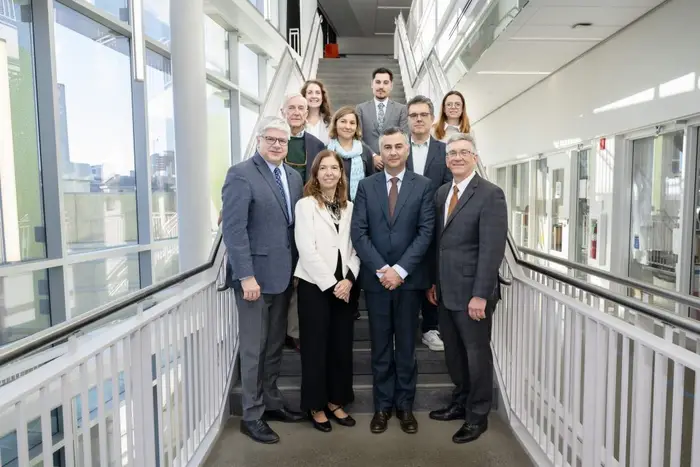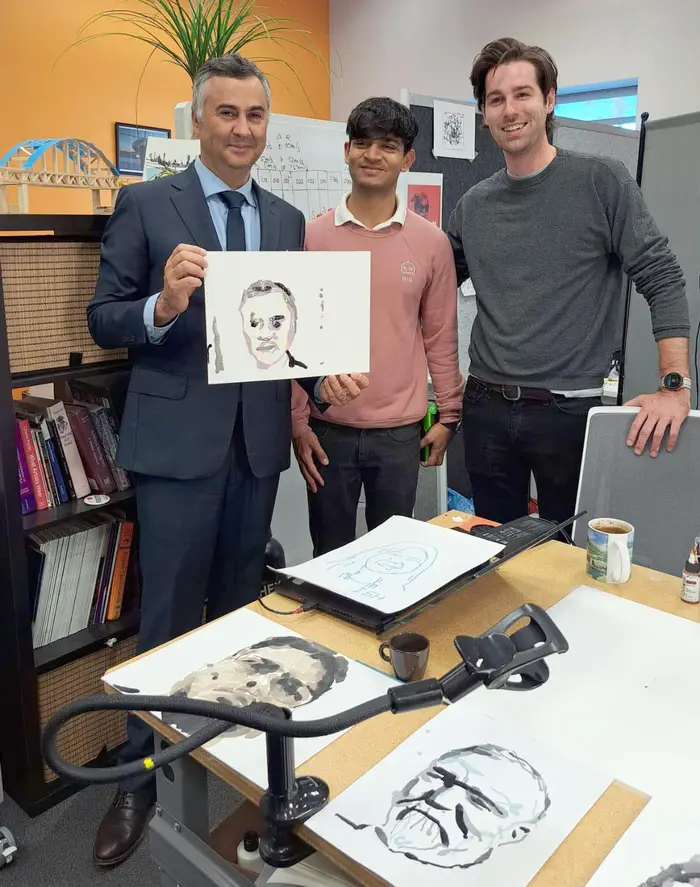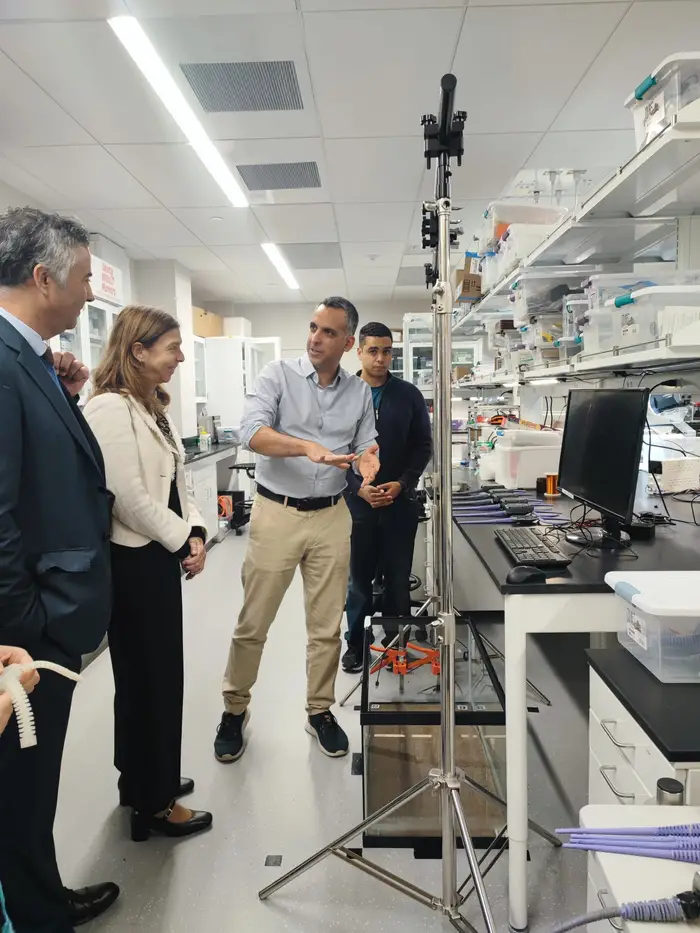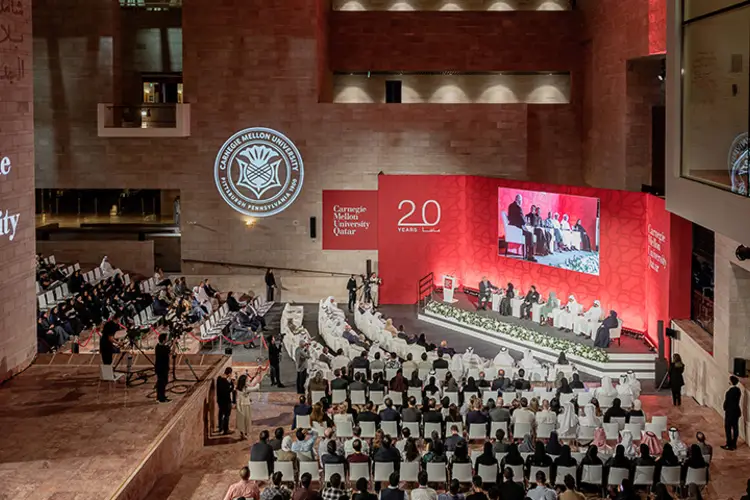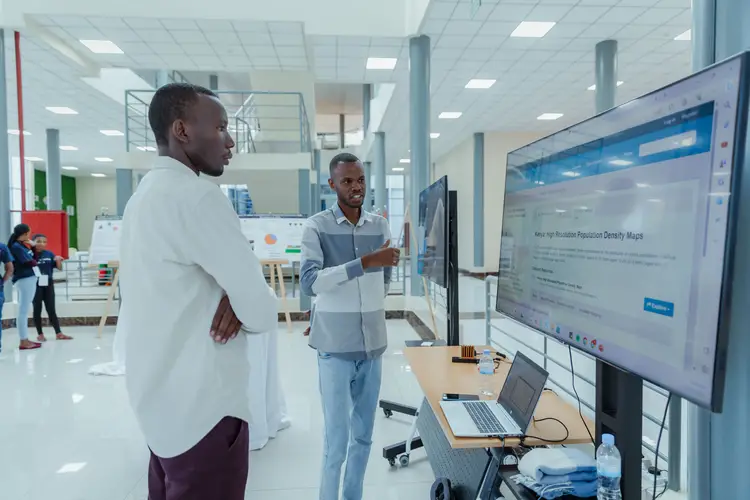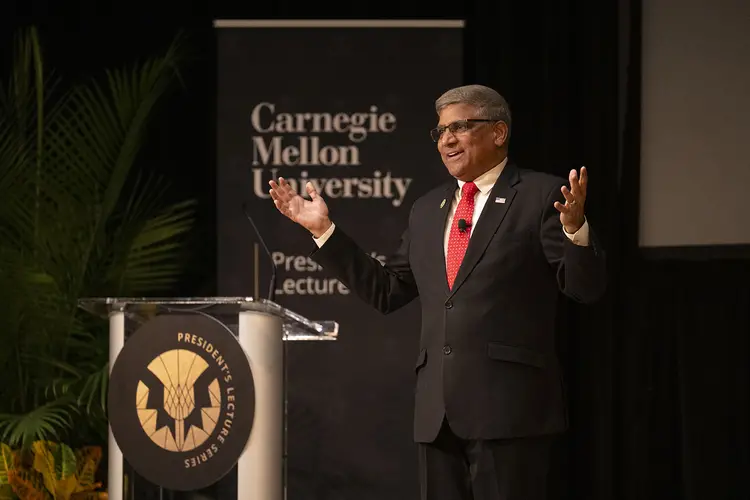Portuguese Delegation Visits Carnegie Mellon
Media Inquiries
Portuguese Minister of Education, Science and Innovation Fernando Alexandre(opens in new window) made his first official visit to Carnegie Mellon University in Pittsburgh, alongside the Secretary of State for Science Ana Paiva(opens in new window) to attend the 2024 CMU Portugal Summit.
The two-day event brought together the Portuguese and CMU communities for a series of discussions and an overview of the CMU Portugal Program, aiming to support the Minister’s reflection and evaluation of the partnership’s future.
Provost and Chief Academic Officer James H. Garrett Jr.(opens in new window) and Dr. William D. and Nancy W. Strecker Dean of the College of Engineering Bill Sanders(opens in new window) warmly welcomed the Portuguese delegation, which included CMU Portugal directors (opens in new window)Inês Lynce, João Magalhães and José M. F. Moura, as well as administrators, faculty members and Ph.D. and master’s students. The agenda featured lab tours, research presentations by faculty and students, networking lunches and meetings with CMU faculty leaders.
The Summit was a platform to shape a shared vision for the partnership’s future. It brought together partners from both sides of the Atlantic, fostering networking opportunities, building new connections, and laying the foundation for future collaborations.
Research connections
The delegation had the opportunity to interact with students at CMU’s Robotics Institute(opens in new window) (RI) during a lab visit hosted by Jean Oh(opens in new window), associate research professor. During the visit the students demonstrated FRIDA, a robotic arm equipped with a paintbrush powered by artificial intelligence in addition to other prototypes being developed at the lab.
FRIDA, named after Frida Kahlo, stands for Framework and Robotics Initiative for Developing Arts. The project is led by Peter Schaldenbrand, a Ph.D. candidate, with RI faculty members Oh and Jim McCann(opens in new window), and is designed to collaborate with humans to create works of art.
The CMU team asked FRIDA to paint a portrait of the minister, and the result was an impressive mixture of art and technology.
The delegation met with researchers across the university, such as Tom Mitchell(opens in new window), the Founders University Professor of the Machine Learning Department at CMU; Peter Adams(opens in new window), Thomas Lord Professor of Engineering and Head of the Engineering and Public Policy Department (EPP)(opens in new window).
The Heinz College of Information Systems and Public Policy(opens in new window) at CMU merges technology, analytics, and public policy to develop innovative solutions to complex societal challenges. The delegation had the opportunity to learn more about the work being developed by the college and by the CMU Block Center for Technology and Society(opens in new window) in a session led by Ramayya Krishnan(opens in new window), dean of the Heinz College of Information Systems and Public Policy.
Richard Scheines(opens in new window), the Bess Family Dean of the Mariana Brown Dietrich College of Humanities and Social Sciences, and Ken Koedinger(opens in new window), Hillman Professor & METALS Program director in the Human-Computer Interaction Institute (HCII), hosted a session on the science of learning(opens in new window), with a look into research and education centered on humanity, focusing on an interdisciplinary work to address complex global issues and advance human understanding.
The second day kicked off with a visit to Carnegie Mellon’s HCII, where Brad Myers(opens in new window), the Charles M. Geschke Director and Professor, delivered a presentation on the work underway at HCII to develop human-centered software, services and systems that improve lives through technology. The visit included a guided experience to the Interactive Structures Lab(opens in new window) by Assistant Professor Alexandra Ion(opens in new window) and Associate Professor Chris Harrison(opens in new window), showcasing the lab’s interactive computational design tools research.
The Soft Machines Lab(opens in new window) at Carnegie Mellon University Robotics Institute recently moved to new facilities. The delegation visited the new lab during a tour led by its head, Carmel Majidi(opens in new window), Clarence H. Adamson Professor, Department of Mechanical Engineering(opens in new window), who shared the cutting-edge research being conducted in areas such as soft robotics, stretchable circuits and printable conductive ink, among other innovative technologies.
Maysam Chamanzar(opens in new window), associate professor in the Department of Electrical and Computer Engineering, offered a glimpse into research focused on understanding the neural basis of brain function and harnessing its potential. Chamanzar’s lab(opens in new window) develops innovative tools and techniques to advance the explanation of brain function and dysfunction.
A culture of innovation
Innovation is a key area of the CMU Portugal program, and since its launch in 2006, 26 startup companies have been supported by CMU Portugal activities. João Paulo Cunha, a scientific director at CMU Portugal, introduced different successful cases of initiatives connected to the program.
Meredith Grelli(opens in new window), director of Project Olympus(opens in new window), a part of the Swartz Center for Entrepreneurship(opens in new window), also spoke. Founded in 2007 at the School of Computer Science(opens in new window), Project Olympus provides support and resources to faculty, students, alumni and staff aspiring to transform their research and ideas into startups. So far, it’s helped launch more than 1,400 startups.
To conclude the Summit Sessions, Nuno Nunes and Paulo Marques introduced the CMU Portugal Academy(opens in new window), whose first edition was launched in September 2024. Nunes, former National Co-Director of the partnership (2018 – 2024), is one of the founders of this advanced training center in digital technologies based in Lisbon, which was developed through a collaborative effort between the Instituto Superior Técnico, Faculty of Sciences of the University of Lisbon, NOVA School of Science and Technology, and Carnegie Mellon University, with the support from the Santander Portugal Foundation.
Marques, a scientific director at CMU Portugal and faculty member for the Product Management course, provided an overview of this inaugural edition that features three advanced training programs: AI, Data Science, and Machine Learning; Product Management; and User Experience and Service Design. Marques also shared his vision for the academy’s future, emphasizing its role in fostering innovation and excellence in digital technologies.
